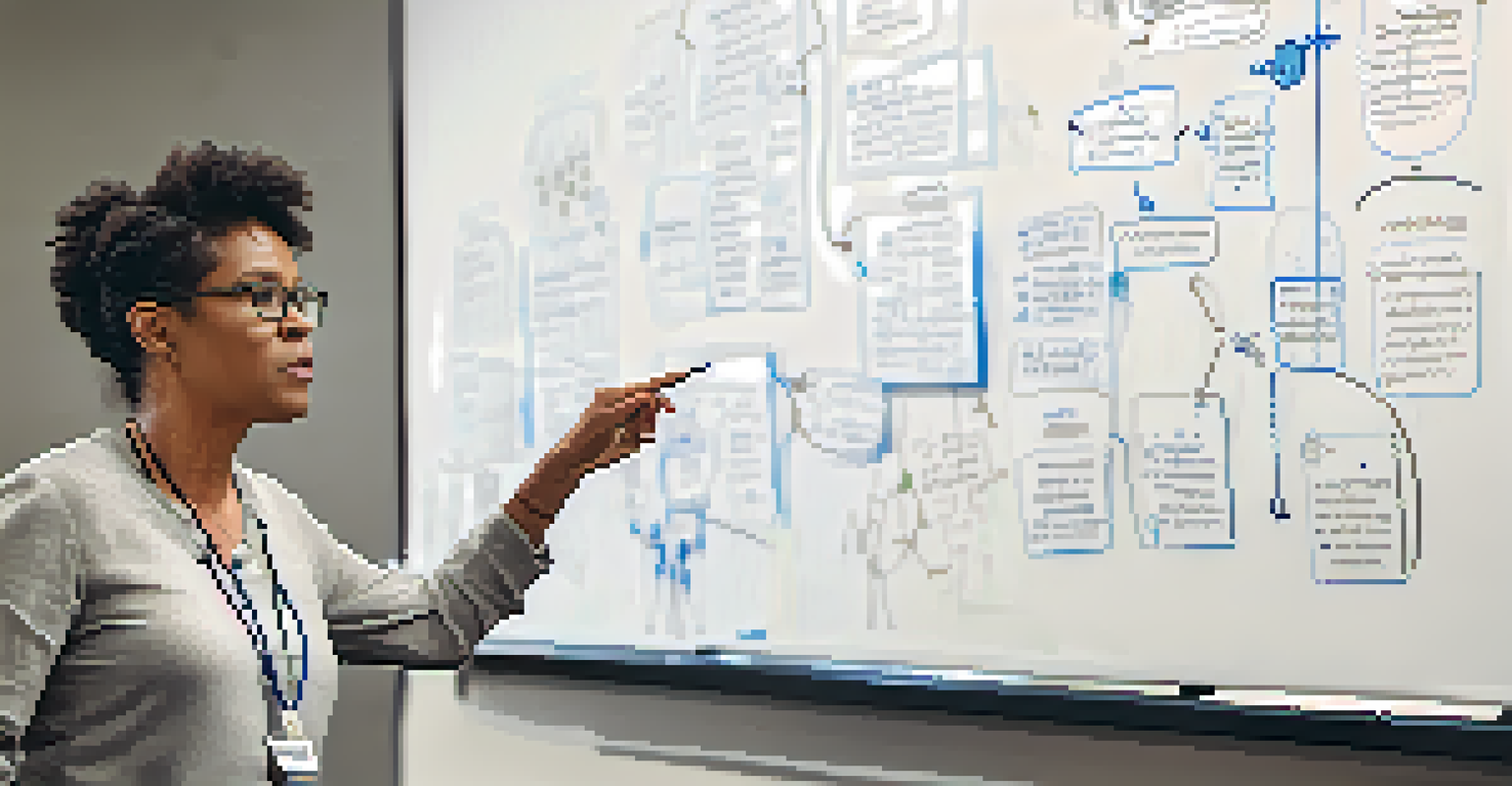Facilitating Growth: Key Skills for Workshop Leaders

Understanding the Role of a Workshop Leader
A workshop leader is more than just a facilitator; they are a guide on a journey of learning and growth. Their role involves creating an environment where participants feel comfortable sharing ideas and experiences. By understanding the dynamics of a group, workshop leaders can navigate discussions effectively, allowing for deeper exploration of topics.
The single biggest problem in communication is the illusion that it has taken place.
Moreover, a good workshop leader recognizes the varied learning styles within a group. This awareness helps them to tailor their approach, ensuring that everyone can engage meaningfully. It’s like being a conductor of an orchestra, where each member plays a unique part that contributes to a harmonious outcome.
Ultimately, the effectiveness of a workshop leader lies in their ability to foster connections among participants. This not only enhances collaboration but also enriches the learning experience, making it memorable and impactful.
Effective Communication: The Heart of Leadership
Effective communication is a cornerstone skill for workshop leaders. It encompasses not just clear verbal communication but also active listening, which helps build trust and rapport among participants. When leaders listen attentively, they demonstrate that every voice matters, fostering a culture of openness.

Additionally, non-verbal cues play a significant role in communication. Body language, eye contact, and even pauses can convey understanding and encouragement. Leaders who master these elements can create a more engaging and supportive atmosphere, helping participants feel seen and valued.
Workshop Leaders Foster Connections
Effective workshop leaders create an inclusive environment that encourages participants to share diverse perspectives and collaborate.
In essence, strong communication skills enable workshop leaders to articulate ideas clearly while also being receptive to feedback. This two-way dialogue is crucial for facilitating growth and ensuring that the workshop meets the needs of all participants.
Creating an Inclusive Environment for All
An inclusive environment is vital for the success of any workshop. Workshop leaders must ensure that all participants feel welcome and valued, regardless of their background or experience level. This can be achieved by setting ground rules that emphasize respect and openness from the outset.
Diversity is the one true thing we all have in common. Celebrate it every day.
Incorporating diverse perspectives enriches discussions and enhances learning. Leaders can encourage this by using icebreakers or collaborative activities that highlight individual contributions. Just as a garden thrives with a variety of plants, a workshop flourishes when diverse voices come together.
Moreover, recognizing and addressing any barriers to participation is essential. Whether it's language, confidence, or prior knowledge, a thoughtful leader will adapt their approach to ensure everyone has a chance to engage fully.
Mastering Facilitation Techniques for Engagement
Facilitation techniques are the tools of the trade for workshop leaders. These techniques help guide discussions, manage group dynamics, and keep participants engaged. Whether it's brainstorming sessions, small group discussions, or interactive activities, a skilled leader knows how to mix and match these methods to suit the group's needs.
For example, using visual aids can enhance understanding and retention of information. Workshop leaders can incorporate slides, charts, or even props to illustrate key points. This not only makes the content more relatable but also caters to visual learners in the group.
Communication Builds Trust
Strong communication skills, including active listening and non-verbal cues, are essential for workshop leaders to engage participants and facilitate meaningful discussions.
Ultimately, the goal of mastering facilitation techniques is to create a dynamic learning environment. When participants are actively involved, they are more likely to absorb the material and apply it in real-world situations.
Encouraging Critical Thinking and Reflection
Encouraging critical thinking is a vital skill for workshop leaders. By prompting participants to question assumptions and explore different angles, leaders can deepen their understanding of the material. Techniques such as open-ended questions or scenarios can stimulate thoughtful discussions that challenge preconceived notions.
Reflection is another powerful tool for growth. Leaders can provide time for participants to ponder what they’ve learned and how it applies to their own experiences. Just like a mirror, reflection allows individuals to see their progress and identify areas for improvement.
Incorporating both critical thinking and reflection not only enhances the learning experience but also empowers participants to take ownership of their development. This process turns a workshop from a passive event into an active journey of discovery.
Adapting to Different Learning Styles and Needs
Every participant brings a unique set of experiences and learning styles to a workshop. A successful leader recognizes this diversity and adapts their teaching methods accordingly. By incorporating a mix of auditory, visual, and kinesthetic activities, leaders can engage all types of learners effectively.
For instance, while some participants may thrive in discussions, others might prefer hands-on activities or visual presentations. By offering a variety of formats, leaders can cater to individual preferences and enhance overall comprehension. Think of it as a buffet; the more options available, the more likely everyone will find something they enjoy.
Adapt to Learning Styles
Successful workshop leaders recognize and adapt to different learning styles, using a variety of teaching methods to ensure all participants can engage and learn effectively.
Ultimately, adapting to different learning styles creates a more enriching experience for everyone involved. When participants feel their needs are met, they are more likely to engage actively and retain what they've learned.
Evaluating Workshop Success for Continuous Improvement
Evaluating the success of a workshop is crucial for continuous improvement. It allows leaders to assess what worked well and what could be enhanced in future sessions. Gathering feedback through surveys or informal discussions can provide valuable insights into the participants' experiences.
Moreover, self-reflection is equally important for leaders. After each workshop, taking the time to review what went well and what could be improved can help refine their approach. It’s like a coach reviewing game footage to enhance performance in the next match.

Ultimately, a commitment to evaluation and improvement not only benefits the leader but also enhances the learning experience for participants. This cycle of reflection and adaptation ensures that workshops remain relevant and effective, paving the way for ongoing growth.